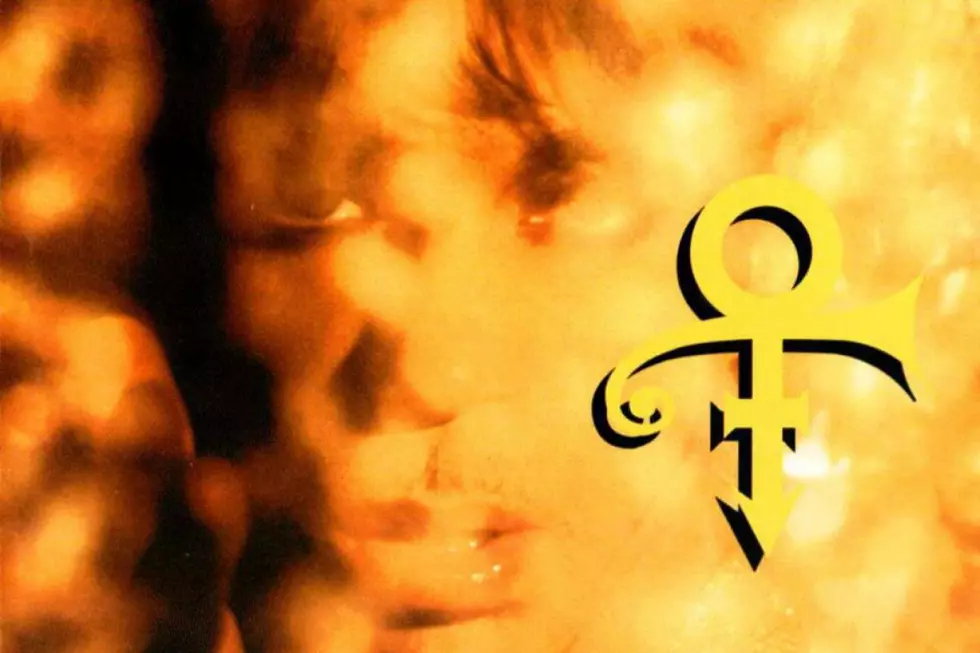
Prince’s ‘The Gold Experience': A Guide to Every Track
Prince’s 17th studio album, The Gold Experience, was the first to be released after he changed his name to an unpronounceable "Love Symbol" as part of a public feud with Warner Bros. Records — a battle which led him to scrawl "SLAVE" on the side of his face with a marker pen.
It’s widely considered that the artist then formerly known As Prince’s albums from this era were mere contract-fillers, handed into Warners to allow him to break free of their artistic chains and release music at his own pace. But The Gold Experience is different. Released on Sept. 26, 1995, it’s clear that the Artist took Gold quite seriously as a potential hit. And while it did have hits, it didn’t quite bring him the success he was hoping for.
Read on for a brief track-by-track guide to the album, and links to more detailed stories about every song, taken from Diffuser's 365 Prince Songs in a Year series.
“P. Control”
Prince kicks off the album with one of his strongest forays into hip-hop. Despite the chorus’ use of the word “pussy,” “P. Control” is actually an anthem for female empowerment. Prince raps the story of the oddly-named protagonist as she sees off bullies and suitors to pursue her education and career. The attitude expressed in the song is emblematic of Prince’s lifelong support of female musicians, from Wendy & Lisa to 3rdeyegirl and beyond.
“Endorphinmachine”
A straight-ahead rock track, “Endorphinmachine” displays the 1995 incarnation of Prince’s band, the New Power Generation, in blazing form. Unlike much of Prince’s work, which saw the Purple One playing every instrument himself, this recording showcases the talents of Michael B. on drums, Sonny T. on bass, and Morris Hayes & Tommy Barbarella (who gets called upon by name for a solo) on keyboards.
“Shhh”
It wasn’t unusual for Prince to pen a song for another artist before deciding he’d rather record it himself (see also: “Kiss” and “International Lover”), but “Shhh” was one of the few tracks that he recorded himself after another artist had already released their version. In this case, it was teen heartthrob Tevin Campbell who did it first. He put the track out on the Prince-assisted album I’m Ready in 1993. There’s no record that Campbell was upset about Prince taking it back, but the two never worked together again.
“We March”
On “We March,” Prince taps into his political side, advocating for racial, financial and gender equality, and evoking Dr. Martin Luther King Jr. in his threat to protest if things don’t improve. Though Prince’s music didn’t get political often, this song is part of a tradition that runs all the way through to one of his final singles, “Baltimore.”
“The Most Beautiful Girl In The World”
Warner Bros. refused to release “The Most Beautiful Girl In The World” themselves in 1994, fearing “market saturation.” Instead, they allowed Prince to put it out via an independent distributor. With that in mind, it was astoundingly successful. It was the Artist’s first U.K. No. 1, and his last U.S. Top 10 hit. The song’s chart success is likely down to its earworm melody, and the universal appeal of its lyrics. It’s widely thought to be written about Prince’s then-girlfriend and future wife Mayte Garcia, but Garcia herself has a different theory…
“Dolphin”
Another full band, guitar-based track, the lyrics to “Dolphin” make very little sense at first: "If I came back as a Dolphin would you listen to me then? / Would you let me be your friend? / Would you let me in?" Unsurprisingly considering their strained relationship during its recording process, the song is actually a cryptic diss track aimed at Warner Bros.
Read more: Prince Wants to Come Back as a ‘Dolphin’
“Now”
Prince dipped his toe into the hip-hop waters once again for “Now.” Rapping over a scratch-heavy beat, the artist urges his fellow “freaks” to get on the dance floor. The “NPG Operator” speaking the interlude before the song tells us it is "great for dancing and improving self-esteem," even if one lyric does seem to advocate under-eating to lose weight. "Other songs in this category include “Irresistible Bitch,” “Housequake,” and “Sexy MF,”" she says. “Now” doesn’t measure up to any of them, but what does?
“319”
Prince’s stunning falsetto is on display throughout “319.” Think “Kiss,” but noisier and less catchy. The high-volume instrumentation appears to be scoring a photoshoot, with Prince as the photographer and his paramour as the model. According to PrinceVault, “319” was inspired by Elizabeth Berkley, the star of the movie Showgirls, in which the song also appeared.
“Shy”
Telling the story of a mysterious woman, who may or may not be a murderer, this atmospheric song is built around the interplay between Prince’s acoustic guitar and electric bass. Though he was primarily known as a singer, guitarist and pianist, Prince’s bass skills were just as impressive. Countless bassists have praised his playing over the years, and this track shows why.
Read more: Prince Becomes a Bass Hero on ‘Shy’
“Billy Jack Bitch”
Prince often had a difficult relationship with the press. Though critics adored many of his albums, the artist was a notoriously private individual, and gossip columnists prying into his personal life was not something he took lightly. Though Prince denied it, “Billy Jack Bitch” is widely understood to be about a specific Minneapolis journalist, one who now calls “Billy Jack Bitch” her favorite Prince song.
“Eye Hate U”
Far more than just another lovelorn ballad, “Eye Hate U” was written about and for Prince’s ex-girlfriend Carmen Electra. After he discovered her and guided her to fame, Prince broke up with Electra when he discovered she’d pursued another man. As part of the breakup process, Prince gave her an exclusive preview of “Eye Hate U” and told her to listen closely to the song’s lyrics. Melodramatic? Perhaps, but this is Prince.
“Gold”
“Gold,” as the album’s epic closer, was meant to be the new “Purple Rain.” Prince said so himself. Sadly, it didn’t live up to expectations. As a single, it only reached No. 88 in the charts. “Purple Rain,” on the other hand, reached the Top 10 in dozens of countries. It’s been suggested that Prince was trying too hard to replicate his past successes with “Gold,” but the song does do a good job of closing the album. It’s just overshadowed by the song the artist himself compared it to.
More From 92.9 WTUG










